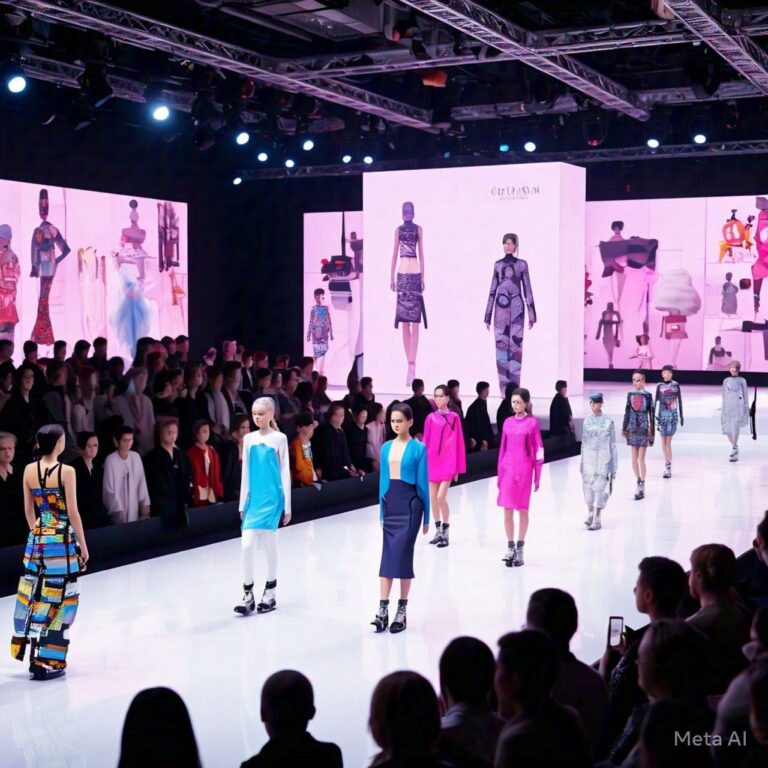Artificial Intelligence AI has revolutionized numerous industries, and the fashion world is no exception. From design and manufacturing to retail and marketing, AI technologies have permeated every aspect of the fashion industry, reshaping traditional practices and opening up new possibilities. This article explores the profound impact of AI on fashion, highlighting key advancements, challenges, and future trends.
AI’s Role in Fashion Design and Innovation
In recent years, AI algorithms have become instrumental in fashion design processes. Designers now use AI-powered tools to generate unique patterns, styles, and even entire collections based on vast datasets of trends, consumer preferences, and historical fashion archives. This integration of AI not only speeds up the design process but also enhances creativity by offering novel insights and inspiration that human designers might overlook.
AI’s ability to predict fashion trends accurately has also transformed how brands anticipate consumer demand and plan their collections. By analyzing social media trends, runway shows, and consumer behavior data, AI algorithms can forecast upcoming styles and preferences with remarkable accuracy, helping fashion houses stay ahead in a highly competitive market.
AI in Manufacturing and Supply Chain Management
AI has optimized manufacturing processes in the fashion industry, leading to increased efficiency and sustainability. AI-powered systems can analyze production data in real-time to identify inefficiencies, minimize waste, and streamline logistics. For instance, AI algorithms can predict demand fluctuations, optimize inventory levels, and even automate garment production using advanced robotics and 3D printing technologies.
Moreover, AI-driven supply chain management solutions enable better transparency and traceability throughout the supply chain, addressing concerns related to labor conditions, ethical sourcing, and environmental impact. These innovations not only improve operational efficiency but also align fashion brands with growing consumer demands for sustainability and ethical practices.
AI-Powered Personalization and Customer Experience
One of the most transformative impacts of AI in fashion is its role in enhancing customer personalization and experience. AI algorithms analyze vast amounts of customer data, including browsing history, purchase behavior, and social media interactions, to create personalized recommendations and tailored shopping experiences.
AI-powered virtual stylists and chatbots offer personalized styling advice and customer support, mimicking the in-store experience online. These tools not only improve customer satisfaction but also drive sales by delivering relevant product recommendations and promotions based on individual preferences and behaviors.
AI in Marketing and Branding
AI has fundamentally altered fashion marketing strategies, enabling brands to create targeted, data-driven campaigns that resonate with their target audience. AI algorithms analyze consumer sentiment, trends, and market dynamics to optimize marketing content, including advertisements, social media posts, and email campaigns.
Furthermore, AI video generators have revolutionized how fashion brands create ai video and distribute video content. These tools use machine learning algorithms to automatically edit, enhance, and even generate video content. By leveraging AI video generators, fashion brands can produce high-quality promotional videos, runway highlights, and behind-the-scenes footage efficiently and cost-effectively. This enhances brand visibility and engages consumers in more immersive and compelling ways.
Challenges and Ethical Considerations
Despite its transformative potential, AI adoption in the fashion industry comes with challenges and ethical considerations. Concerns about data privacy, algorithm bias, and the displacement of human workers in manufacturing are prominent issues that stakeholders must address. Ensuring transparent AI practices, ethical data usage, and responsible AI deployment is crucial to mitigating these challenges and building trust among consumers and industry stakeholders.
Future Trends and Opportunities
Looking ahead, the future of AI in fashion promises continued innovation and evolution. Advances in AI technologies such as computer vision, natural language processing, and predictive analytics will further refine personalized shopping experiences, sustainable manufacturing practices, and trend forecasting capabilities. Moreover, AI-driven virtual reality VR and augmented reality AR applications using AI video app will transform how consumers interact with fashion products, offering virtual try-on experiences and immersive shopping environments.
In conclusion, AI has profoundly impacted the fashion industry by revolutionizing design, manufacturing, marketing, and customer experience. As AI technologies evolve, fashion brands that embrace AI-driven innovation stand to gain a competitive edge by delivering more personalized, sustainable, and engaging experiences to consumers worldwide.

